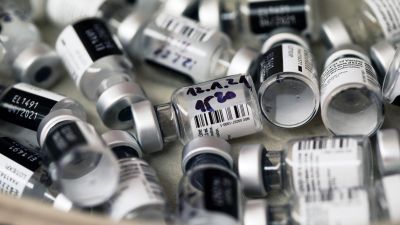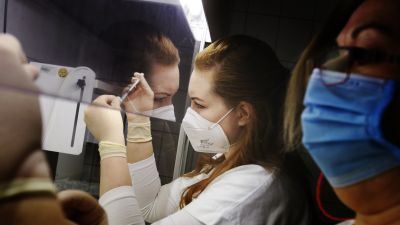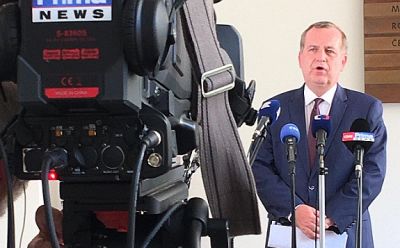This week Charles University hosted a webinar as part of its continuing public debate series Česko a jak dál. The topic this time was disinformation and fake news in connection with Covid-19. Disinformation has been part of the mix from the very beginning of the pandemic.
Alena Zachová discusses fake news with moderator and journalist Luboš Palata (right). Michal Kormaňák is on-screen.
There was plenty of room for the spread of disinformation, rumour and untruths, some of which have been difficult to dislodge even now and crop up again and again in threads online. Coronavirus as a topic, and fake news with it, spread at a volume over the last year that eclipsed previous “hot” online issues including one of the most polarizing in recent years, migration.
Over the course of the broadcast, guests Alena Zachová, the head of social media analysis at Newton Media, and Michal Kormaňák of IPSOS Czech Republic discussed public perception of the pandemic through the prism of fake news as well as the dissemination of falsehoods on social platforms and how fake news negatively affects social ties and the public discourse. Kormaňák said that past surveys suggested that some 80 percent of Czechs had experience with disinformation and that 55 percent had fallen, at some point, for a fake news item. Thirty-five percent felt that disinformation clearly influenced the public discourse and felt they had a detrimental impact on relationships inside or outside the family. On the bright side? Young people and students, studies suggest, are more capable at seeing through fake news as well as more likely to fact check and, critically, to distinguish reliable and trusted sources from shady ones.
Newton Media’s Alena Zachová discussed some key “giveaways” or common elements often used to recognise fake news, among them a manipulative use of images and language specifically to elicit an overriding emotional response. Examples could be images of children in danger, or symbols or evocative imagery of growing threats.
In the second two-thirds of the webinar biochemist Jan Konvalinka, the Vice-Rector for Research at Charles University, outspoken about Covid and dedicated to separating fact from fiction, then discussed what we know and still need to learn about Covid-19. He fielded questions from both the moderator and from viewers online. A telling moment came when a viewer asked about a specific medicine “alleged to be 100 percent effective against Covid” that “had been ignored.” Professor Konvalinka, familiar with the case, debunked the story saying that no chemical study conducted had confirmed such a result or a potential avenue worth pursuing.
Professor Jan Konvalinka answers questions from the public in detail.
Other issues Konvalinka discussed included how it had been possible to develop mRNA vaccines and other vaccines in the space of just 10 months (which in the past he compared in the past to the Manhattan Project during WWII). Whether one should try to boost one’s immune system; what Covid-19 possible origins were; what the overall scientific consensus was, and whether vaccines that have gotten the highest approval could prove dangerous over time (having unforeseen side effects). Another question was why some respected scientists had tended to make light of Covid-19 in the Czech Republic when the country had been so hard hit since the second wave began in the autumn. There, Professor Konvalinka suggested that perhaps Czechs had been victims of their own success in the first wave in March of 2019. Then, the country, its health care workers and scientific community, had responded so quickly and effectively, limiting the number of Covid-related deaths to a little over 300 by the end of May, that it may have lulled some into a false sense of security, a feeling that the virus was less deadly and that the response had perhaps been overblown. Italy and France, Konvalinka said, had experienced just the opposite – full hospitals and morgues.
The final takeaway? The fact there are vaccines such as Pfizer-BioNTech and Moderna (and potentially others) that have proven effective, is the only realistic - and ethical - way to turn the corner on Covid.
When asked when we might see an improvement or return to something like our previous lives, Konvalinka hesitated for just a moment but agreed that the moderator’s suggestion of June… “would be great.” Going out again without masks, going to the movies, going down to the pub, meeting friends… were mentioned and seemed almost nostalgic at this point. Everything, quite clearly, will depend on how effectively vaccination will continue to be coordinatedat facilties, as well as how well the country manages to lower the current spread of Covid and keep down the number of new infections hereon in. No one expects that to be easy.
You can watch the full webinar in Czech below.






















